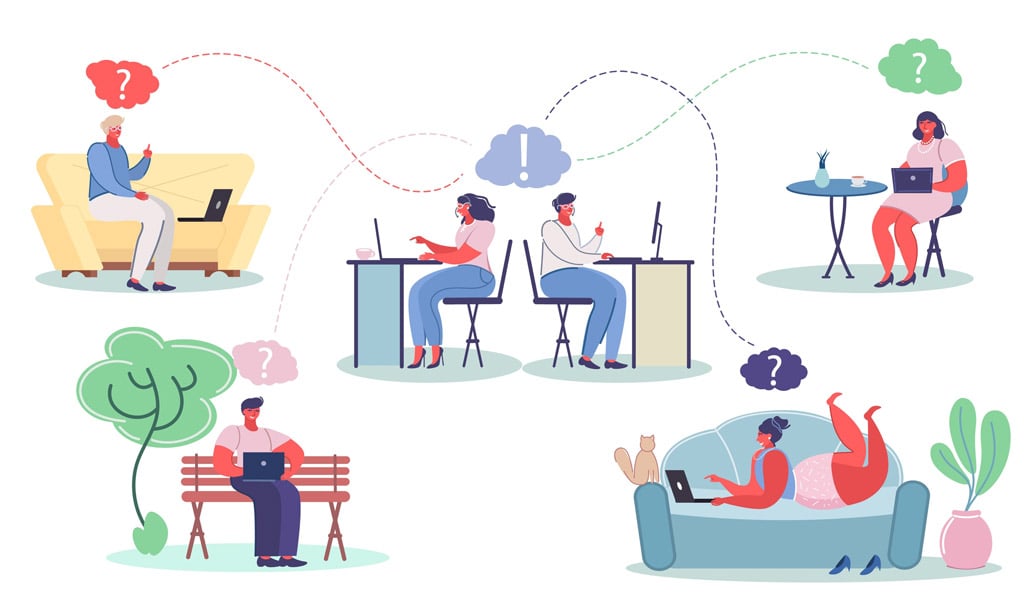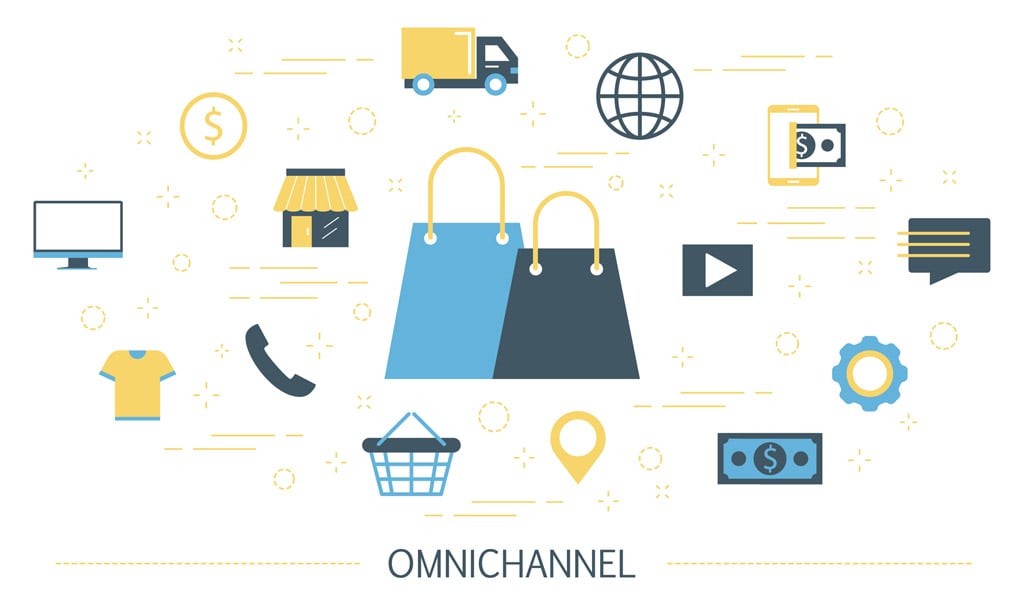
Omnichannel platforms come in all different shapes and sizes and choosing the best platform for your business can be a challenge. Why? Because omnichannel has now overtaken multichannel as the preferred strategy in business. Multi-channel is when several different channels are blended so they can work together cohesively. In marketing, this could mean that several different distribution and promotional channels are blended. In sales, it could mean that different lead generation tools can be blended. In customer service, it could mean that several communication channels are supported by the business and are available to customers.
With omnichannel, the focus is on providing a completely seamless experience to both customers and users. Rather than simply having access to different pieces of software with a united goal or function, the software is fully blended, usually using one platform. This one platform allows different software to feed into it, so employees can conduct all their work from one place. Since the software and it’s data isn’t split and siloed, customers experience a more seamless experience. Customers should be able to seamlessly navigate from one customer touchpoint to the other without their experience altering. This means that the company keeps a tighter control over the experiences their customers have and can more easily deliver excellent customer experiences.
The exact omnichannel platform you need for your business will depend on what you hope to achieve and your specific needs. You might choose a platform based on how well it can support one team, for example, the customer service team. Or you may be looking for a platform that is highly flexible and can be used across multiple teams. However, there are key things that every good omnichannel platform should have in common. That’s what we’re focusing on today. Here’s our list for the top 8 things to look for when picking your next omnichannel platform.
Why Choose an Omnichannel Platform?
Before we delve into what you need to look for, first it’s a good idea to give a little recap into why an omnichannel platform is a great choice. You’ve already heard how an omnichannel platform can lead to improved customer experiences, but how do the numbers stack up? One study found that businesses that adopt omnichannel strategies have 91% better customer retention rates year on year than businesses who don’t.
One of the main selling points of an omnichannel platform is how it promotes seamlessness across customer touchpoints, but why is this important? Because the way we use devices has changed dramatically over time. 15 years ago, the average customer would only use two touchpoints. Today, the average customer uses more than four touchpoints. This means you are alienating your customers if you don’t provide a seamless experience across all touchpoints.
Customers today also have much higher expectations than in the past. They are now well versed in the capabilities of modern tech and software and they understand what is possible. This means that they will compare the experience they have with your company to the experiences they’ve had with other companies. If they have a poor experience, they will hold you accountable for it because they understand that the limitation is you, and not the current capabilities. An Accenture study found that 89% of customers become frustrated when they have to repeat their issues to multiple representatives. Omnichannel platforms help to eliminate this issue. Customers today also expect real-time or very prompt responses to their questions. Failing to do this can quickly erode trust but is easily handled with an omnichannel platform.

8 Things to Look for When Choosing Your next Omnichannel Platform
1. Security
A good omnichannel platform will be able to take from several sources and feed it to their user in an easy to understand way. A good platform will also use data analytics tools and dashboards to help employees make better business decisions. Any time that you are trusting a third party software with your data, you have to ensure their security is up to scratch.
Data breaches are alarmingly common, just some reports showing that 25% of businesses have experienced a data breach in the last month. You have to ensure that the security surrounding your omnichannel platform is robust. Customer data should always be protected and hashing, and encryption should be used where appropriate. You should also limit what information agents have access to. While it’s true that most employees are hardworking and trustworthy, one rogue employee can cause a lot of damage. As a general rule, agents should only have access to the information they need to perform their role, and only when they are performing their role.
If the omnichannel platform provider you are looking at has no advice or standards surrounding security or how to manage the platform safely, then this could be a red flag. Companies that care about security typically put a lot of time and money into perfecting their security standards and technology. Security is one of those areas where if you do everything right, no one will notice you’ve done anything at all. This means that when a company does invest in making their software secure, they like to talk about it. It will likely be a part of their marketing or their software overview documents. The money and time invested are well spent if it keeps their client’s data secure and gives them peace of mind.
2. Out of The Box
Ideally, you want to find an out of the box omnichannel solution. Why? Because you want to start using this software straight away. You also want to instantly know whether it’s a good fit for your business. When you opt for bespoke solutions, these can quickly get expensive and take a lot of time to engineer. It’s simply at odds with how most businesses operate in the modern age.
Businesses want quick results because they want to start out doing their competition tomorrow, not in 6 months. Things change fast in 2020, and technology can quickly become outdated. With a bespoke omnichannel platform, it will be outdated the minute it goes live.
With an out of the box solution, you see the benefits immediately, and can also count on getting upgrades periodically.
3. Innovative Companies
This ties into the last point about how quickly technology advances in the modern age. You should look for a company that continually updates and improves its omnichannel platform to offer more functionality to its clients. Data analytics, dashboards, chatbots, and more play a key role in omnichannel platforms. This is all tech that is advancing at a rapid rate, so you want to be with a company that can keep up with these advancements. If you pick a company that is known for continually innovating and updating its platform, you can see yourself race ahead of the competition if they are with a less innovative company.
4. Flexibility and Scalability
One of the key things you should be looking for is how fit-for-purpose the platform is for your company. Flexibility and scalability are key elements of this because they capture how your company might look in the future, not just today. You might find that in the future you have 10 times or 100 times as many customers as you do today. Will the platform still work for you if this is the case? What about if you need to hire many more agents? Can it support that too? What if you want to expand your use of the platform to use in other departments or across the whole business? Will it work in these areas or is it really only useful in one area?
These are all questions you need to ask when deciding whether the platform is right for you. Otherwise, you might find that you need a different omnichannel platform in the future, or that you need several (which would defeat the point of having an omnichannel platform in the first place).

5. Look for Hidden Costs
Make sure you understand exactly what you are getting for your money. Some companies use tricky pricing and confusing pricing structures to hide the true cost of buying or using the platform. Make sure you finalized the cost and determine exactly what the platform is capable of for the price you are paying. When using subscription models, make sure that the price doesn’t increase dramatically if you need to scale up your usage at a later date. Some companies will price the subscription model low, but then charge extremely high prices if you go over a certain threshold. They do this because by this point you are probably already dependent on using the platform and are reluctant to switch.
6. Data Insights
Great omnichannel platforms will give you key insights into your customer and sales data. You will be able to use this data analysis to action evidence supported business decisions. You will also be able to build new goals and benchmarks for your business. This is about unlocking the power in your data so you can continue to move forward and perform at even greater levels. Data insights are a huge driving force for success in modern businesses, and you’ll be doing your business a disservice if you don’t utilize them.
7. A Platform with a Sleek User Interface That Is Well Liked by Employees
Remember that your employees will need to use this platform every single day for their job. This means you should always keep your employees at the forefront of your mind when picking your omnichannel platform. Don’t be captivated by flashy features that sound impressive but will rarely be used. Instead, think about what tasks your employees need to complete every day. Think about the things they do most often and ask whether this platform can help them do this. Think about where your employees lose time due to slow systems or erroneous data, will this platform be able to help with this.
Omnichannel platforms are great at optimizing your business and increasing your performance, but only when you focus on the areas that most need to be optimized. You should communicate with your employees during the discovery process to make sure you are picking the right platform for them. The user interface is one of the crucial elements of an omnichannel platform. The UI must be sleek, responsive, and easy to use, even for employees with little experience in the company.
8. A Provider Who is a Good Communicator
Pay attention to how quickly the provider answers your questions and how thorough their answers are. Also make sure you check the reviews of the provider, if there are any. With an out of the box solution, you may go through a teething period where things aren’t working perfectly to begin with. This is fine, and in many ways, expected. It’s how the company responds to these important issues that you need to pay attention to. You want the company to be highly communicative and prompt in their responses. You want to feel assured that if you ever encounter a problem, it will be solved quickly, ideally before your customers even notice.